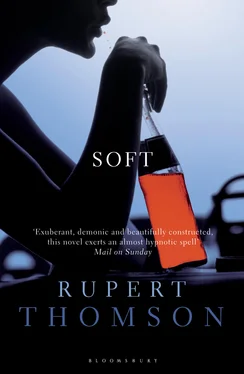‘Are you all right?’ she asked, leaning towards him.
He nodded. He had finished work at two-thirty the night before and then he had played a few frames of snooker with Ray Peacock. He hadn’t got to bed till four.
‘You’re tired.’ She looked down. ‘We should have met up later. In the afternoon. I didn’t think.’
‘Jill,’ he said, and put his hand on hers.
She looked at him across the table, the colour in her eyes seeming to heighten and bleach at the same time, as if, in touching her, he’d had some chemical effect.
He hadn’t known her well at that point. He still thought she was one thing when really she was something else entirely. The first time they saw each other, at the party, she’d had a few drinks. Also, she was a sumptuous woman, with full breasts, wide hips and heavy thighs, which only added to the impression he had formed, that she was bold and confident. How could she not be, he had thought, with a body like that? He couldn’t have been more wrong, of course. It had taken him months to realise how shy she was, how many doubts she carried round with her. For example: she could stand outside a clothes shop for twenty minutes before she found the courage to go in — or sometimes, after twenty minutes, she would simply lose her nerve and turn away.
After breakfast they took the ferry to Cremyll, a short ride across the River Tamar. He followed her to a white wooden bench at the back of the boat. As the engines surged and the ferry slid away from the stone jetty, Jill turned her face into the sunlight, closed her eyes and sighed. Sitting beside her, he admired her black hair falling to her shoulders and the strong white column of her throat.
‘Beautiful today,’ she murmured.
When she opened her eyes again, she saw that he had been watching her and she looked away quickly, pretending to take an interest in the naval buildings that occupied the waterfront.
A stretch of densely wooded coastline, Mount Edgcumbe was surrounded on three sides by water, which gave it the feeling of an island. On landing, they visited the gift shop first, then wandered idly through the formal gardens, past fountains and summerhouses, emerging at last on to a wide gravel path that ran along the edge of the park. They sat on the sea wall, its stone heated by the sun. It was hard to believe it was September. Behind them, an ilex hedge rose twenty feet into the air, its sides shaved flat by some meticulous gardener. From a distance it appeared to have cracks in it, like certain kinds of cheese or marble.
Later, outside a temple, they met a man with wild white hair who told them he was a photographer. He was taking pictures of the trees, he said, his voice oddly eager. They nodded, though they didn’t understand why he might be doing that, and they were too lazy to ask. In the end, he hurried on ahead of them, muttering something about the light. They followed the path, which took them up a hill, past clumps of pink and blue hydrangea, then through a wood and up again into a high meadow. The grass was coarse and windswept, faded by its long exposure to the elements. Several cedars spread their stark, flat branches against the sky. Breathing hard from the climb, they rested by a ruined tower that had a view over Plymouth Sound. They watched ships ease past Drake Island and into the docks. As they stood there, leaning on the crumbling, ivy-covered masonry, clouds filled the sky to the west. By the time they began to walk again, the sun had vanished and a soft drizzle was falling. The cedars suddenly looked black.
‘I was hoping we could get to Minadew Brakes.’ Jill opened the leaflet she had bought from the shop and showed it to him on the map. They were less than halfway there.
They walked on, across the bare hillside, into the woods. Gradually the drizzle turned to rain, and soon it was so heavy that they could hardly hear each other speak. Though the overhanging trees formed a kind of roof above the footpath, they were still getting drenched. They had no choice but to retrace their steps. He saw the disappointment rise into her face, making it look crooked.
‘Another time,’ he said. Though he suspected even then that it would never happen.
‘Minadew. It means black stone, they think.’ The crash of the rain, her voice almost lost in it.
Under a beech tree, with big drops bursting through the leaves, he put his arms round her and kissed her. She pressed her body into his until he could feel the whole shape of her against him. He found a place where the ground wasn’t too wet and spread his coat for her. She lay down, skirt plastered to her thighs, eyes glowing with a strange, astonished light. He lay beside her, half on top of her. Under her clothes her body was as warm as bread just taken from the oven.
‘I haven’t got anything,’ he said after a while.
She reached sideways into her bag and handed him a Durex. He looked at it, surprised. This was the beginning of the eighties, before AIDS was talked about in England. You hardly ever saw a woman with a condom.
‘I never carried one with me before,’ she said. ‘Only today.’
He believed her, and was flattered.
While they were lying together on the ground, he saw the photographer hurry past, his wild hair flattened against his head, his tripod wrapped in green plastic so that it resembled a piece of light artillery.
A Sunday, years ago. Her beauty.
And now the very different beauty of a girl he’d seen only once in his life. A girl whose picture he carried everywhere with him, like a man in love.
A girl who didn’t even know that he existed.
He walked out of London Bridge Station and turned right, then right again, into the street that ran under the railway. The sun shone into the tunnel, an almost rancid light, revealing dust and filth. A young woman hurried towards him along the narrow pavement, her shadow thrown down in front of her like a joker that would trump whatever card he played. He supposed she must be frightened by the sight of him — his dark clothes, his scar. She didn’t look at him as he stepped into the gutter to let her pass. He noticed she was muttering under her breath. Prayers. So nothing happened to her.
In the daylight on the far side of the tunnel he stood still for a moment, his eyes adjusting. Late afternoon, the sun dropping in a clear blue sky. He moved on, through a housing estate. Block A, Block B. The screams of children from an open first-floor window, a cat slithering beneath a fence.
The shortcut home.
Barker had opened the window in the lounge so he could listen to the rain landing in the back yard three floors down. After the weeks of hot dry weather, it sounded unfamiliar, exotic. The TV was on, some comedy show. He was only half-watching, his mind elsewhere. He almost didn’t hear the front door. It was late, after eleven. In Plymouth people often called round on the off chance that you might be in. Not in London, though. Then he remembered Pentonville Road in the bright sunshine and Charlton shouting something about Monday week. He couldn’t face the idea of Charlton. He wasn’t in the mood.
Reaching for the remote, he pressed MUTE. He watched a comedian lift his eyebrows, round his mouth into an O, then smile smugly. The door buzzed again. Barker switched the TV off, walked out into the corridor and picked up the entryphone. The small screen flickered on — a grainy picture, black-and-white. The man from the Lebanese restaurant appeared. Lambert, as he called himself. Well, perhaps it wasn’t such a surprise. In a way, Barker supposed he must have been expecting it. Two men stood in the background, only parts of them visible. Shoulders. An ear. Hair. He remembered what Andy, the man who had fitted the entryphone, had said. There’s only two kinds of people who go in for them. Rich people, and people like you. And then he’d said, No disrespect or nothing.
Читать дальше












